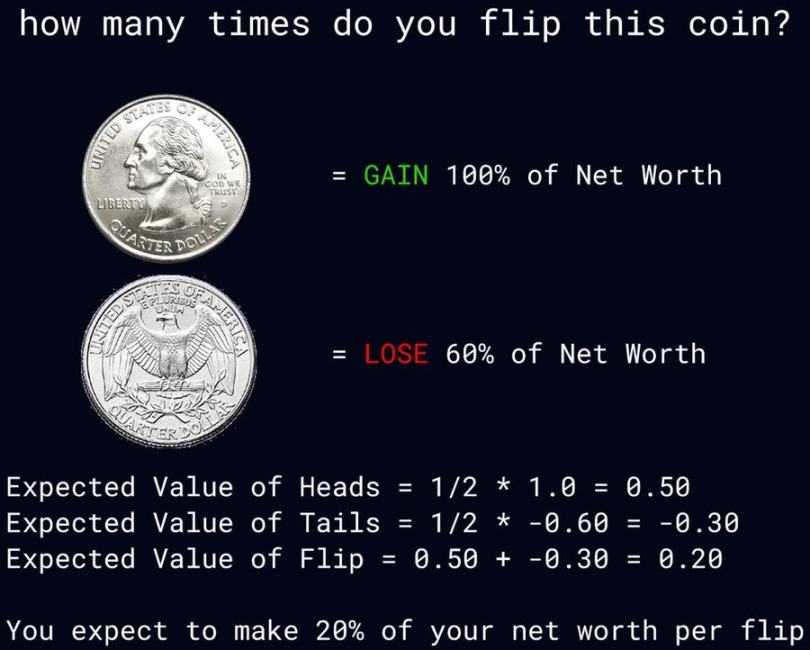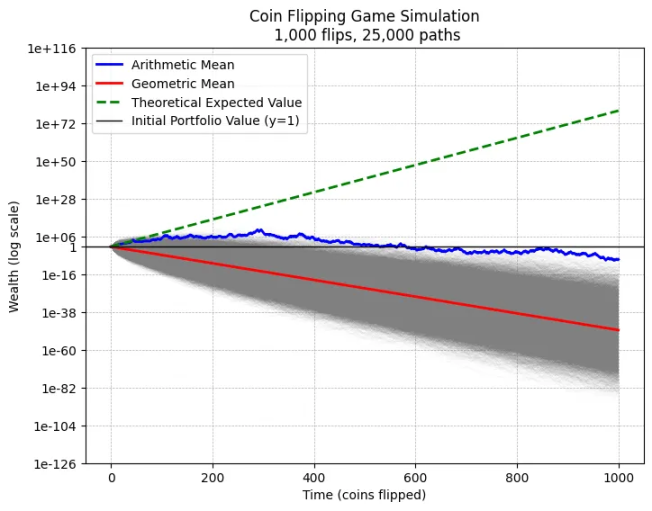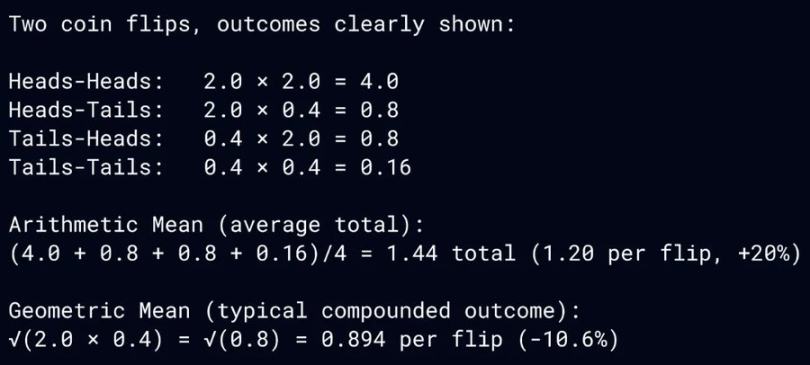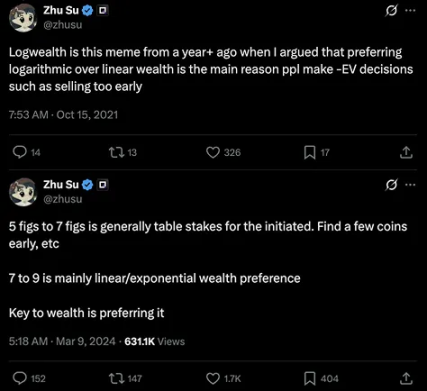Author: thiccy
Translation: AididiaoJP, Foresight News
The Era of High-Risk Preference Speculation
This article explores the shift in risk preference towards positive expected return gambling and its broad social implications. It includes a small amount of mathematical calculations, but the logic is clear and easy to understand.
Imagine you are participating in this coin toss game. How many times would you toss? The rules of the game are that if it’s heads, your assets grow by 100%; if it’s tails, your assets lose 60%.

At first glance, this game seems like a money printing machine. The expected value of each coin toss is a positive 20%, meaning that with each toss, your assets are expected to grow by 20%. Theoretically, if you toss the coin enough times, you could accumulate the wealth of the entire world.
However, the reality is that if we simulate 25,000 people each tossing a coin 1,000 times, almost everyone will end up with nothing.

This outcome is due to the multiplicative effect of repeated coin tossing. Although the expected value of the game (arithmetic mean) is a positive 20% for each toss, the geometric mean is negative, which means that in the long run, the compound interest of this game is actually negative.
How can we understand this? Here’s an intuitive explanation:

The arithmetic mean measures the average wealth created by all possible outcomes. In this coin toss game, wealth is highly concentrated in scenarios where consecutive heads are almost impossible. The geometric mean measures the wealth level corresponding to the median outcome.
The above simulation reveals the difference between the two. Almost all paths will lead to zero. In this game, you need to toss heads 570 times and tails 430 times just to break even. After 1,000 tosses, all expected values are concentrated in just 0.0001% of the results with consecutive heads, which are extremely rare occurrences.
The difference between the arithmetic mean and the geometric mean forms what is known as the jackpot paradox. Physicists refer to it as the ergodicity problem, while traders call it volatility decay. When expected values are locked in events with extremely low probabilities, they are unlikely to materialize. Excessively chasing low-probability events leads to volatility turning positive expected values into a path to zero.
The early 2020s crypto culture is a vivid example of the jackpot paradox. SBF once tweeted about wealth preferences, sparking this conversation:
- Logarithmic wealth preference: Each dollar is worth less than the previous dollar, and as capital grows, risk preference decreases.
- Linear wealth preference: Each dollar has the same value, regardless of how much profit has been made, maintaining the same risk preference.

SBF proudly claimed to have a linear wealth preference. Since he planned to donate all his wealth, he believed that doubling from $10 billion to $20 billion was just as important as earning $10 billion from $0, thus high risk and high return were reasonable.
Su Zhu, the founder of Three Arrows Capital, also agreed with the linear wealth preference and further proposed an exponential wealth preference:

Exponential wealth preference: Each dollar is worth more than the previous dollar, and as capital grows, risk preference increases, willing to pay a premium for extremely low probability events.
How do these three wealth preferences manifest in our coin toss game? According to the jackpot paradox, it is clear that SBF and Three Arrows Capital are tossing coins infinitely, and this mindset is precisely how they initially accumulated wealth. It is also not surprising that both SBF and Three Arrows Capital eventually evaporated billions of dollars. Perhaps in some parallel universe, they are trillionaires, proving the rationality of their risks.
These liquidation events are not only cautionary tales of risk management mathematics but also reflect a deep cultural shift towards linear and exponential wealth preferences.
Founders are expected to adopt linear wealth thinking, acting as cogs in the venture capital machine, betting heavily to maximize expected value. The stories of Elon Musk, Jeff Bezos, and Mark Zuckerberg betting their entire fortunes to become the world's richest reinforce the myth driving the entire venture capital field, while survivor bias easily obscures the millions of entrepreneurs who have gone to zero.
This preference for excessive risk has permeated everyday culture. Wage growth has severely lagged behind capital compounding, leading ordinary people to increasingly place their hopes for real upward mobility on negative expected value jackpots. Online gambling, zero-day options, retail meme stocks, sports betting, and crypto meme coins are all examples of exponential wealth preference. Technology has made speculation more widespread, and social media spreads every rags-to-riches story, luring the masses into a massive losing gamble like moths to a flame.
We are becoming a culture that worships the jackpot, pricing the cost of survival as zero.
Artificial intelligence exacerbates this trend by further devaluing labor and intensifying winner-takes-all outcomes. The AGI utopia envisioned by technological optimists, where humans spend their days in art and leisure, is more likely to result in billions of people chasing negative-sum capital and jackpots with UBI subsidies. Perhaps "forever up" should be redesigned to reflect the blizzards experienced on paths to zero—this is the true outline of the jackpot era.
In its most extreme form, capitalism behaves like a collectivist hive. The mathematics of the jackpot paradox suggests that civilization views humans as interchangeable labor, sacrificing millions of worker bees to maximize the linear expected value of the group, which is rational. This may be the most efficient for overall growth, but it is brutal for the worker bees.
Marc Andreessen's declaration of technological optimism warns: "Humans should not be caged; they should be useful, productive, and dignified."
But the rapid advancement of technology and increasingly radical risk preferences are pushing us toward the outcome he warned against. In the jackpot era, growth is fueled by caging peers. Usefulness, productivity, and dignity are increasingly confined to a privileged few who win the competition. We have elevated the average at the expense of the median, leading to a widening gap in liquidity, status, and dignity, breeding an entire negative-sum cultural phenomenon. This externality manifests as social unrest, beginning with the election of demagogues and ending in violent revolution, which comes at a high cost to the compounding growth of civilization.
As someone who makes a living trading in the crypto market, I have witnessed the decay and despair spawned by this cultural shift. My victories are built on the corpses of thousands of other traders, a monument to wasted human potential.
When industry insiders seek trading advice from me, I can almost always spot the same pattern: they are over-leveraged and have deep drawdowns. The underlying reason is often a scarcity mindset: a sense of "falling behind" and an impulse for a quick turnaround.
My answer is always the same: build more advantages, not more risk. Don’t commit suicide in pursuit of the jackpot. Logarithmic wealth is key. Maximize the median outcomes. Create your own opportunities, avoid drawdowns, and one day you will succeed.
But most people will never be able to build a sustainable advantage. "Win-win" is not a scalable suggestion; in this competition of technological feudalism, meaning and purpose become winner-takes-all. This brings us back to meaning itself. Perhaps we need some kind of religious revival that reconciles ancient spiritual teachings with modern technological realities.
Christianity spread due to its promise of universal salvation. Buddhism spread by claiming that everyone could attain enlightenment.
The modern version must also provide dignity, purpose, and alternative paths for all, lest they self-destruct in the pursuit of the jackpot.
The Psychological Foundations of the High-Risk Preference Speculation Era
This obsession with the jackpot has deep psychological roots. The human brain has evolved to have a strong preference for immediate rewards, a mechanism that aided survival in the hunter-gatherer era but has become a trap in the modern financial environment. The dopamine system is abnormally sensitive to potential high returns, even when the actual probabilities are minuscule. Neuroscience research shows that when people fantasize about winning a jackpot, the activation patterns in their brains are almost identical to when they receive small, guaranteed rewards.
Social media and fintech products cleverly exploit these neural mechanisms. The infinite scroll of information, instant trade execution, and dazzling displays of returns create a perfect addiction loop. Every success story is algorithmically amplified, while countless failure cases are quietly filtered out. This distorted information environment reinforces the illusion of "the next one could be me."
The Failure of the Education System
The modern education system has, to some extent, fostered this jackpot mentality. Standardized testing and elite selection mechanisms are essentially a winner-takes-all competition, where students are indoctrinated from a young age with a "all or nothing" mindset. The star effect in fields like arts and sports further reinforces this notion. By the time young people enter society, they are already accustomed to defining success in terms of extreme outcomes rather than gradual accumulation.
University education is increasingly viewed as a lottery, where a few gain massive returns through the halo effect of prestigious schools, while the majority bear heavy loans with limited rewards. This structure naturally leads people to seek other forms of "lottery"—whether it be cryptocurrencies, influencer economies, or entrepreneurial booms.
The Financial System's Complicity
The modern financial system is technically the perfect engine for jackpot culture. Zero-commission trading, leveraged products, and derivatives allow ordinary people to engage in speculation that was once the domain of professional institutions. Algorithmic market makers and dark pool trading create an illusion of liquidity, obscuring the actual negative-sum nature of the game.
The venture capital industry has institutionalized jackpot logic. Successful funds often rely on a few hundred-fold return projects to compensate for the majority of failed investments. This model is revered as a standard, yet few question its long-term impact on the innovation ecosystem. When all resources chase possible unicorns, those businesses that steadily generate moderate returns are left unsupported.
The Erosion of Social Mobility
The prevalence of jackpot culture is closely related to the decline of social mobility. As opportunities for the middle class to achieve upward mobility through traditional paths (education, career advancement) diminish, extreme speculation naturally becomes an alternative choice. The financialization of the real estate market has turned housing from a basic need into a speculative tool, further exacerbating this trend.
The widening intergenerational wealth gap creates a vicious cycle: young people without family wealth support are more inclined to take high-risk actions, which in turn leads to greater wealth differentiation. When social safety nets are weak, people's tolerance for "all or nothing" bets increases abnormally.
The Dilemma of Technological Accelerationism
The current narrative of technological accelerationism resonates dangerously with jackpot culture. The blind worship of exponential growth ignores the fundamental limits of physical and social systems. When every startup claims to "change the world," the actual output is often zero-sum or negative-sum financial engineering.
This is particularly evident in the blockchain and AI fields. Most projects do not create substantial value but attract capital through complex token economics and arbitrage opportunities. The result of this technological financialization is a bubble-filled ecosystem where true innovation struggles to gain resources and attention.
Possible Solutions
To reverse the jackpot culture, reforms are needed on multiple levels:
- Financial regulation: Limit the availability of leverage and speculative products, and strengthen behavioral regulation of fintech.
- Educational reform: Cultivate students' probabilistic thinking and long-term planning abilities, reducing the overemphasis on rankings.
- Tax policy: Impose heavy taxes on short-term capital gains to encourage long-term investment.
- Media responsibility: Require social media platforms to balance the presentation of speculative risks and returns.
- Social security: Establish a more comprehensive safety net to reduce the economic pressures that drive people to take risks.
Ultimately, we need to redefine the standards of success. A healthy society should reward sustained value creation rather than random lucky breakthroughs. This requires a comprehensive shift from individual mindsets to institutional designs, and it is a difficult long march against deep-seated psychological biases.
免责声明:本文章仅代表作者个人观点,不代表本平台的立场和观点。本文章仅供信息分享,不构成对任何人的任何投资建议。用户与作者之间的任何争议,与本平台无关。如网页中刊载的文章或图片涉及侵权,请提供相关的权利证明和身份证明发送邮件到support@aicoin.com,本平台相关工作人员将会进行核查。




